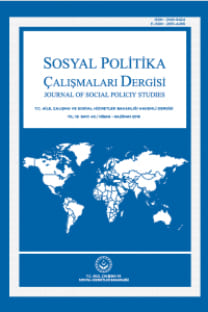SOSYAL PERFORMANSIN ÖLÇÜMÜNDE YENİ YÖNTEM: SOSYAL GELİŞME ENDEKSİ VE TÜRKİYE'NİN GÖRÜNÜMÜ
A NEW METHOD FOR MEASURING SOCIAL PERFORMANCE: SOCIAL PROGRESS INDEX AND TURKEY S OUTLOOK
___
- ergh, J. (2008). The GDP paradox, Journal of Economic Psychology, 30, ss. 117-135. Bergh, J. (2010). Relax about GDP growth: implications for climate change and crisis policies, Journal of Cleaner Production, 18(69), ss. 540-543. Bishop M. ve Green M. (2011). We are what we measure, World Policy Journal, 28, ss. 11- 15. Boarini, R. ve Dercole M. M. (2013). Going beyond GDP: An OECD perspective, Fiscal Studies, 34(3), ss. 289-314. Cha, M. (2013). Whats missing from GDP, The Explainer DEMOS Series, Erişim tarihi: 15.11.2015, http://www.demos.org/publication/whats-missing-gdp. DEMOS. (2012). Beyond GDP: New measures for a new economy. DEMOS Reports. Erişim tarihi: 13.10.2014, http://www.demos.org/publication/beyond-gdp-new- measures-new-economy. Kubiszewski, I.; Costanzaa, R.; Franco, C.; Lawn, P.; Talberth, J.; Jackson, T. ve Aylmer, C. (2013). Beyond GDP: Measuring and achieving global genuine progress. Ecological Economics, 93, ss. 57-68. Özgenç, N. (2013). Sürdürülebilirlik ve yoksulluk ilişkisi (Yayımlanmış Uzmanlık Tezi). Aile ve Sosyal Politikalar Bakanlığı, Ankara. Erişim tarihi: 30.09.2014, http://www. sosyalyardimlar.gov.tr/tr/27298/2013-Yilinda-Yayimlanan-Uzmanlik-Tezleri. Öztok, D. ve Tapan, D. (2012). Türkiyenin ekoloj ik ayak izi raporu 2012. World Wide Fund for Nature Türkiye. Erişim tarihi: 06.11.2014, http://awsassets.wwftr.panda.org/ downloads/turkiyenin_ekolojik_ayak_izi_raporu.pdf. Stiglitz, J. E.; Sen, A. ve Fitouss, J. P. (2009). Report by the Commission on the measurement of economic perf ormance and social progress. Erişim tarihi: 18.10.2014, http://www. stiglitz-sen-fitoussi.fr/documents/rapport_anglais.pdf . The Social Progress Imperative. (2013). Social progress index report 2013. Erişim tarihi: 25.12.2014, http://www.socialprogressimperative.org/system/ resources/ W1siZiIsIjIwMTNcLA0XC8xMFwvMThcLzE1XC80NFwvNzk4XC9zb2NpYW xfcHJvZ3Jlc3NfaW5k ZXhfMjAMy5wZGYiXV0/social_progress_index_2013.pdf. The Social Progress Imperative. (2014a). Social progress index country scorecard 2014. Erişim tarihi: 15.01.2015, http://www.socialprogressimperative.org/system/ resources/W1siZiIsIjIwMTRcLzA0XC8yMVwvMjJcLzE2XC8yNVwvOTg1XC9T b2NpYWxfUHJvZ3Jlc3NfSW5kZXhfMjAxNF9TY29yZWNhcmRzLnBkZiJdXQ/ Social%20Progress%20Index%202014_Scorecards.pdf. The Social Progress Imperative. (2014b). Social progress index report 2014. Erişim tarihi: 15.01.2015, http://www.socialprogressimperative.org/system/resources/ W1siZiIsIjIwMTRcLzA1XC8yNlwvMTZcLzM0XC81NFwvNzk5XC9Tb2NpYW xfUHJvZ3Jlc3NfSW5kZXhfMjAxNF9SZXBvcnRfZV8ucGRmIl1d/Social%20 Progress%20Index%202014%20Report%20e%20.pdf. United Nations. (2014). The millennium development goals report 2014. Erişim tarihi: 06.02.2015, http://mdgs.un.org/unsd/mdg/Resources/Static/Products/ Progress2014/English2014.pdf. United Nations. (2014). World urbanization prospects: The 2014 revision. Erişim tarihi: 12.01.2015, http://esa.un.org/unpd/wup/Highlights/WUP2014-Highlights.pdf. Walley, S. (2014). Housing the world: Leveraging private sector resources for the public good. Private Sector & Development -Proparcos Magazine, (July). Erişim tarihi: 15.01.2015, http://www.proparco.fr/webdav/site/proparco/shared/PORTAILS/ Secteur_prive_developpement/PDF/SPD19/Proparco_S&D_19_UK_Pour_WEB. pdf.
- ISSN: 2148-9424
- Yayın Aralığı: 4
- Başlangıç: 2012
- Yayıncı: Aile,Çalışma ve Sosyal Hizmetler Bakanlığı
SOSYAL PERFORMANSIN ÖLÇÜMÜNDE YENİ YÖNTEM: SOSYAL GELİŞME ENDEKSİ VE TÜRKİYE'NİN GÖRÜNÜMÜ
Samet GÜNEŞ, Nazlıhan ÖZGENÇ, Selim COŞKUN
AN INTERNATIONAL ORGANIZATION CASE WITHIN THE FRAMEWORK OF INTERNATIONAL SYSTEM: UNHCR
A REVIEW OF THE ROLE OF CONDITIONAL CASH TRANSFER PROGRAMS ON CHILD DEVELOPMENT AND CHILD PSYCHOLOGY
